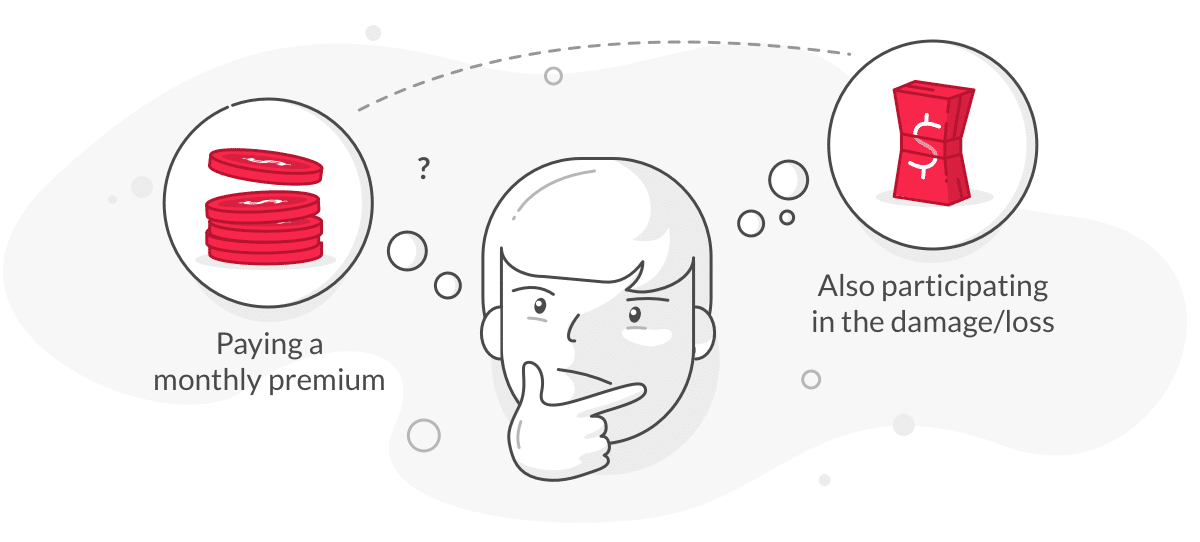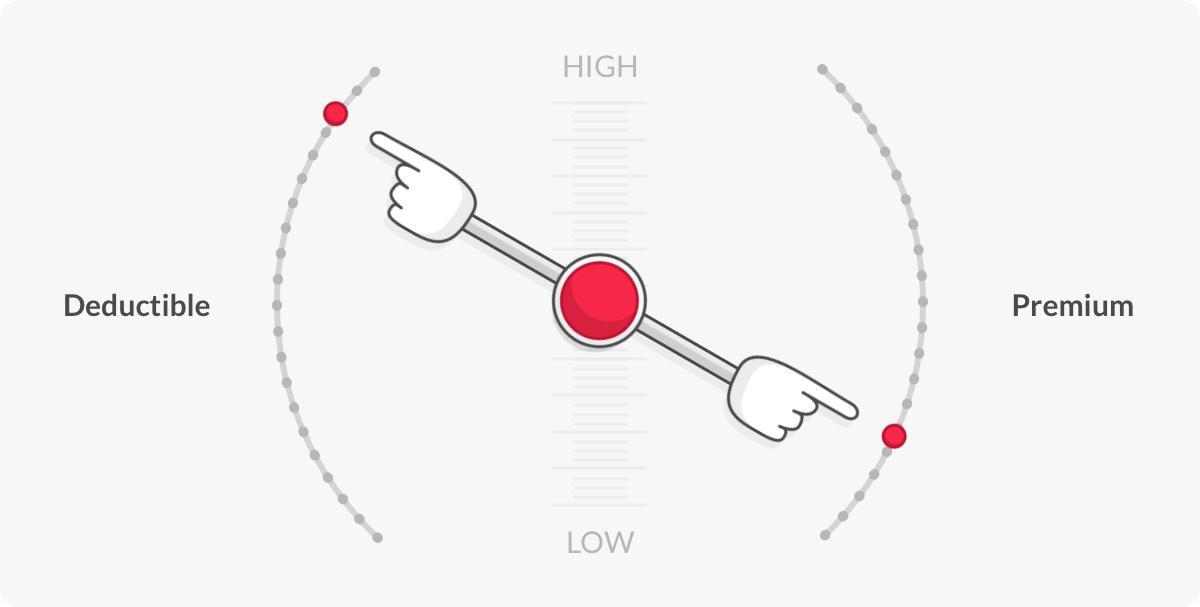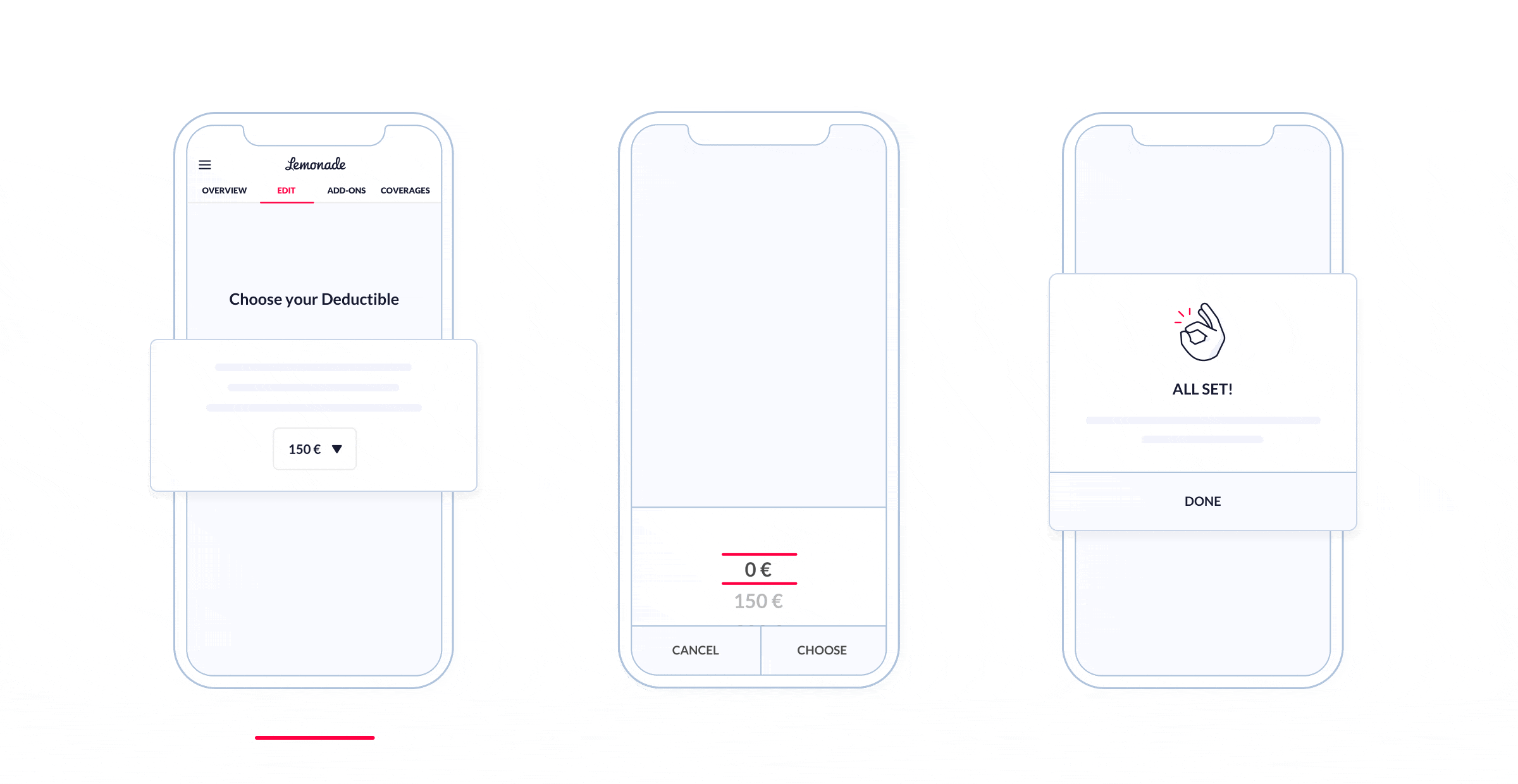Imagine the following scenario: You’re having a conversation, and suddenly the word deductible comes up. You nod your head as if you have a clue and steer the topic to the advantages of minimalism. But now the chat is all about insurance, and you have no clue what a deductible is. Spoiler alert: It is important. Not only does it affect how much you have to pay every month, it also influences the insurer’s impression of you and your odds of getting insured in the first place. Fascinating, isn’t it? More on that later.
We’re here to dive deeper; to give you uncomplicated explanations and practical examples of insurance deductibles.
Buckle up, because here it comes, our answers to the most frequently asked questions on deductibles:
1. What’s an insurance deductible?
2. How do insurance deductibles work?
3. Why do insurance companies have deductibles?
4. How do I adjust my deductible?
Let’s get started!
What is an insurance deductible?
“An insurance deductible is an amount of money you choose when purchasing a policy that will be subtracted from any future claims payouts.”
Let’s assume that someone has stolen your €800 iPhone in a burglary, and your deductible is €300. In this case, your contents insurance would pay you €500.
Think of a deductible as your participation in the damage or loss. You’re saying, “I commit X euros to any claim on future losses or damages, and my insurance company pays the rest.”
It probably sounds a little weird that you have to pay a monthly premium and, on top of that, you won’t get the full value of your stuff in return when things go sideways. But don’t worry, we’ll dig into why that is a bit later. It’ll all make sense, we promise!
Good to know: Usually, your deductible is a fixed euro amount, although some companies offer it as a percentage of your sum insured.

How do insurance deductibles work?
When signing up for a contents or liability insurance policy, you can decide if you want to choose a deductible… or not.
What you’re choosing here is your participation, or the amount subtracted from a claim, in the event that a) something happens to your belongings (contents insurance), or b) if you hurt someone or cause damage to their belongings (private liability insurance).
Here are a few examples:
Scenario A:
1. You chose a deductible of €150 when you purchased your policy.
2. Later on, you file a claim for a €700 TV that was stolen during a burglary.
3. If the claim is approved, your insurer will pay €550 (€700 minus your €150 deductible).
In the case of contents insurance, the deductible you choose should correspond to the total value of your belongings. If you don’t own any expensive stuff, it might be smart to choose none or a rather low deductible. If the total loss is less than your deductible, there’s no point in filing a claim – the insurer won’t reimburse you for anything.
Scenario B:
1. You chose a deductible of €150 when you purchased your contents policy
2. Your €100 headphones fall in the toilet (we hope this never happens!).
3. Since the headphone’s replacement value is lower than your deductible, you won’t get anything from your insurer on this one.
So, now you’re probably wondering… why doesn’t everyone just choose a low deductible or no deductible at all to make sure that if your stuff damaged or goes missing, it’ll be covered in full?
Good question 🙂
In general, the lower the deductible you choose, the higher your monthly insurance rate will be. Conversely, if you choose a high deductible, your insurance rate will be lower.
Stay tuned – in the next paragraph we’ll explain the role deductibles play for insurance companies.

Why do insurance companies have deductibles?
1. Cautious policyholder behavior
If you’re responsible for participating in a future claim, you’re more likely to be a bit more careful when it comes to your things, and you’re also less likely to behave in a risky manner in general. In addition, you’ll file fewer claims overall, since the value will have to exceed a certain amount, meaning you’ll take full responsibility for smaller claims, which brings us directly to the next point:
2. Lower workload for the insurance company
Consider this: how many claims would insurers have to handle if they responded to every single claim, no matter how small? Think for instance of scratched sunglasses, lost scarves, etc. That’s a lot of insurance claims to manage.
The cost associated with these types of claims is enormous. Insurers would have to spend the same amount of time checking a claim for 5 euros as for one for 5,000 euros.
So, if insurers took on every €5 claim that came their way, they’d be stretched too thin. In some cases, the money it would cost to settle the claim would be more than the actual claim amount (Say what?!).
Let’s think about this a little further. If this were really the case, insurance companies would have to hire significantly more staff or develop even better technology to handle the workload. This investment would have to be financed somehow, and would come at the expense of affordable insurance premiums.
3. Lower risk of termination
The thing is, if you file too many claims and get reimbursed, you cost the insurance company a lot of money. Consequently, they can terminate your insurance contract, meaning you’d have to go and find a new insurer. Usually, when you purchase a policy, you’re asked for your “claims history”, which is the number of claims you’ve filed so far. If the number is too high, no insurer will take you on as a client.
Bottom line – with a higher deductible, the fewer claims you file, thus reducing the risk of your insurer trying to get rid of you.
In summary: Insurance companies use deductibles to reduce the risk of claims, and to help keep premium costs at a minimum for all policyholders. But of course, you have to decide for yourself whether a deductible makes sense for you personally and if it fits your individual needs.
At Lemonade, things work a bit differently
Many people experience anxiety before filing a claim, and in many cases, they just give up altogether. And who can blame them?
Often, the stuff we’d like to claim is below the deductible we originally chose, which means that filing a claim wouldn’t make any sense. In other cases, people may be tempted to embellish claims to get them above their deductible amount, and that’s not great either.
Filing claims should be a pleasant and reassuring experience. After all, claims are the reason why we all get insurance in the first place.
If you don’t remember which deductible you selected, simply check out your policy.
If you’re insured with Lemonade, just open your app (available for iOS & Android) and check your deductible there. By the way, with Lemonade you can choose a deductible between €0 (no minimum deductible!) and €500.
In case you want to change your deductible:
1. Click on the policy whose deductible you want to adjust and select “Edit” on the home screen of the app (right next to “Overview”).
2. Scroll down to the “Deductible” section and change it with just a few taps, choosing one of the four options that suits you best.
3. Voilá! The whole process only takes a few seconds, and you’ll receive an email confirmation with your updated policy right away 🙂
Fun fact: You can adjust your deductible in the app without clicking on “Update Policy” to see how a different deductible might affect your monthly premium.

Key Takeaways
1. A deductible is an amount of money you choose when purchasing a policy that will be subtracted from any future claims payouts.
2. In general, a lower deductible means a higher premium, and vice versa.
3. Deductibles exist to make you be a bit more careful with your stuff and to keep the cost of policies low for everyone.


